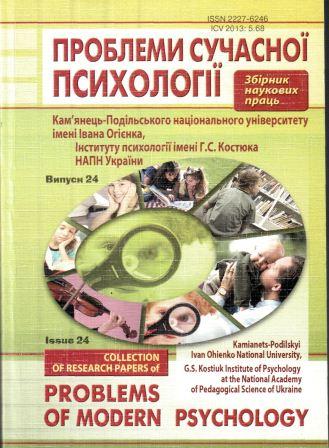Соціально-психологічні детермінанти інгрупового фаворитизму ґендерних груп у соціальній взаємодії
DOI:
https://doi.org/10.32626/2227-6246.2014-24.%25pKeywords:
інгруповий фаворитизм, гендерні групи, маскулінність, фемінність, нормативно-рольові вимоги.Abstract
В статті теоретично
обґрунтовується система соціально-психологічних детермінант інгру-
пового фаворитизму гендерних груп у вигляді характеристик суб’єкта
міжгрупового сприйняття та взаємодії; характеристик груп, які беру-
ють участь у взаємодії; особливостей ситуації міжгрупової взаємодії.
Аналізуються індивідуально-психологічні, міжособистісні та групові
параметри, які представляють кожну групу. Пояснено специфіку чоло-
вічої і жіночої гендерних груп, нормативно-рольових вимог до них, осо-
бливостей психологічної статі та ідентичностей. Визначено необхідність
емпіричного дослідження зазначених параметрів.
References
Агеев В.С. Межгрупповое взаимодействие: социально-пси-
хологические проблемы / В.С. Агеев. – М.: МГУ, 1990. –
С. 6-84, 95-102.
Бем С.Л. Линзы гендера: Трансформация взглядов на про-
блему нера венства полов / С.Л. Бем. – М.: «Российская по-
литическая энциклопедия» (РОССПЭН), 2004. – 336 с.
Гулевич О.А. Психология межгрупповых отношений / О.А.
Гулевич. – М.: Московский психолого-социальный инсти-
тут, 2007. – 432 с.
Кіммел М. Гендероване суспільство / М. Кіммел. – К.: Сфе-
ра, 2003. – 490с.
Клецина И.С. Психология гендерных отношений: Теория и
практика / И.С.Клецина. – СПб.: Алетейя, 2004. – 408 с.
Лопухова О.Г. Психологический пол личности: адаптация
диагностической методики / О.Г. Лопухова // Прикладная
психология. – 2001. – №3. – С. 57-67.
Москаленко В.В. Соціальна психологія / В.В. Москаленко. –
К.: «Центр учбової літератури», 2008. – 688 с.
Оксамитна С.М. Гендерні ролі та стереотипи / С.М. Оксамит-
на // Основи теорії гендеру. – К.: «К.І.С.», 2004. – С.157-181.
Сушков И.Р. Психология взаимоотношений / И.Р. Суш-
ков. – М.: Академический Проект, ИП РАН, 1999. – 448 с.
Ткалич М.Г. Гендерна психологія: навч. посіб. / М.Г. Тка-
лич. – К.: Академвидав, 2011. – 248 с.
Ткалич М.Г. Соціально-психологічні характеристики ген-
дерних груп як суб’єктів гендерної взаємодії в організації /
М.Г. Ткалич, Я.Ю. Кацович // Проблеми сучасної психоло-
гії: збірник наукових праць Інституту психології імені Г.С.
Костюка НАПН України та Державного вищого навчального
закладу «Запорізький національний університет» / За ред.
С.Д. Максименка, Н.Ф. Шевченко, М.Г. Ткалич. – Запоріж-
жя: ЗНУ, 2012. – № 2. – С. 76-82.
Dovidio J.F. Bridging intragroup processes and intergroup
relations: Needing the twain to meet // British Journal of
Social Psychology (2013). – №52. – РР. 1–24.
Hewstone M., Rubin M., Willis H. Intergroup Bias // Annual
Psychological Review, 2002. – № 53. – PР. 575-604.
Jetten J. Intergroup distinctiveness and differentiation: a metaanalytic
integration / J. Jetten, R. Spears, T. Posunes// Journal of
Personal and Social Psychology. – 2004. – Vol.86. – PР. 862-879.
Tajfel H. Social identity and intergroup relations / H. Tajfel. –
Cambridge: Cambridge Univ. Press, 1982.
Turner J. Social Categorization and Self-concept: A social
cognitive theory of group beheviour / J. Turner// Advances in
group processes. – London, 1985. – PР. 77-121.
Downloads
How to Cite
Issue
Section
License
Copyright
The Editorial Board has the full right to publish original scientific papers containing results of theoretical and experimental research works which are not currently subject to review for publication in other scientific editions. The Author shall transfer to the editorial board of the Collection the right to spread the electronic version of the paper, as well as the electronic version of the paper translated into English (for papers originally submitted in Ukrainian and Russian) by all kinds of electronic means (placement at the official website of the Collection, electronic databases, repositories etc).
The Author of an article reserves the right to use materials of the paper, without approval with the editorial board and the founders of this Collection: a) partially or fully, for educational purposes; b) for writing own dissertation papers; c) for preparation of abstracts, conference reports and presentations.
The Author of an article can place electronic copies of the paper (including the final electronic version downloaded from the official website of the Collection) at:
- personal web resources of all Authors (websites, webpages, blogs etc.);
- web resources of the institutions where the Authors are employed (including electronic institutional repositories);
- non-profit public access web resources (for example, arXiv.org).
But in all cases, it is obligatory to have a bibliographic reference to the paper, or a hyperlink to its electronic copy placed at the official website of this Collection.






